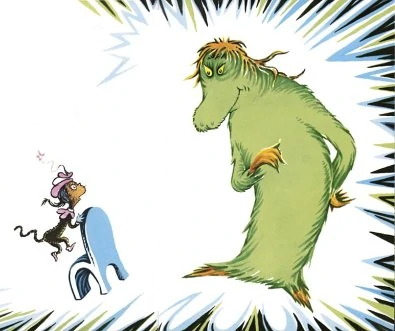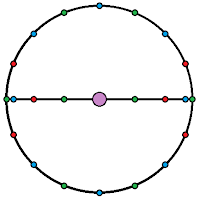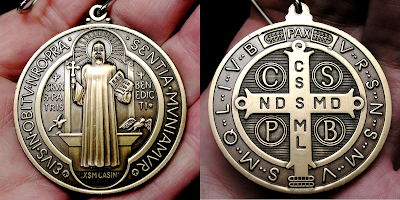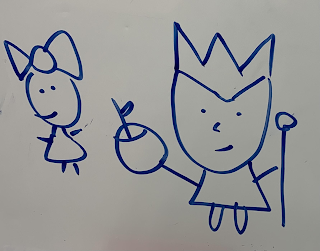Every jumbled pile of person has a thinking part
That wonders what the part that isn't thinking, isn't thinking of
-- They Might Be Giants, "Where Your Eyes Don't Go"
If you make yourself small enough, you can externalize anything.
-- Daniel Dennett
Euryalus, is it
the gods who put this fire in our minds,
or is it that each man’s relentless longing
becomes a god to him?
-- Aeneid, Book IX, Mandelbaum trans.
⁂
How the Glunk got thunk
In the 1969 Dr. Seuss story "The Glunk That Got Thunk," the young Cat in the Hat's sister has the hobby of thinking things up.
A thing my sister likes to do
Some evenings after supper,
Is sit upstairs in her small room
And use her Thinker-Upper.
She turns her Thinker-Upper on.
She lets it softly purr.
It thinks up friendly little things
With smiles and fuzzy fur.
One day, having decided that her friendly little things are "just not fun enough," she determines to "think up bigger things."
"Think! Think!" she cried.
Her Thinker-Upper gave a snorty snore.
It started thunk-thunk-thunking
As it never had before.
With all he might, her eyes shut tight,
She cried, "Thunk-thunk some more!"
Then, BLUNK! Her Thinker-Upper thunked
A double klunker-klunk.
My sister's eyes flew open
And she saw she'd thunked a Glunk!
The rest of the story deals with the problem of getting rid of this "Glunk" -- an uncouth, greenish creature that threatens the family with financial ruin by running up their phone bill -- but we are here concerned not with that, nor even with the question of how the imagined creature somehow became "real" (a tulpa), but rather with the description of how it was thunk up in the first place.
I think Seuss expresses very clearly and memorably the way in which thinking-up -- having ideas -- is under conscious control and the way in which it is not. At one level, the sister is clearly responsible for the thinking-up of the Glunk. It is she who decides to use her Thinker-Upper and turns it on, and it is she who, dissatisfied with the usual "fuzzy little stuff," commands it to think up something bigger. The Thinker-Upper itself, though, is referred to as something almost external to the sister, almost a machine. She turns it on, and it thinks up things for her. I say "almost," though, because of the closing lines of the passage I have quoted: "My sister's eyes flew open, and she saw she'd thunked a Glunk!" This is a recognition that the Thinker-Upper is not really external but is an aspect of the sister's Self -- one which is, somewhat paradoxically, capable of surprising her. She is amazed to discover that she herself (the Thinker-Upper part of herself) has thought up something so unexpected.
Could the sister have consciously decided to think up a Glunk? Could she have deliberated a bit, decided, "I shall now think of a furry, green, blond-headed, halitotic alligator who phones his mother every day," and then proceeded to think it up? No. Not unless the idea of the Glunk was already in her mind -- that is to say, not unless she had already thought it up. You cannot choose to think about a particular thing until you have already thought of it. Before it can be subject to your conscious will, it has to occur to you -- an English expression which is precisely apropos. Having a new idea is not something you do; it is something that happens to you. Thinking-up cannot be conscious -- and when I say cannot, I mean cannot. It is impossible in principle, impossible by its very nature, impossible even for God.
In my 2013 posts "Agency and motive" and "Syllogisms, free will, and the role of attention," I discuss the paradox of being able to act for ourselves but requiring motives in order to do so -- motives which are not directly and consciously chosen by us but are ultimately "given." I describe how attention is the vehicle of the conscious will: As we hold a dilemma or a possible course of action in our minds, more and more relevant considerations to come to mind; by selectively focusing attention on some of these considerations, we cause them to become "stronger" and elicit the appearance of new but related ideas; and in the end we choose when to act -- that is, we choose which moment, which snapshot of the flux of waxing and waning motives, will be realized in action.
I would now expand that model to include not only motives and possible actions, but all thought. Every idea, even one as far removed from action as thinking up a Glunk, necessarily arises unconsciously, and the only role of the conscious will in the process is to direct attention. There is the Thinker-Upper, and there is the Attention-Director, and only the latter is or can be conscious. Because only the Attention-Director is conscious, only it is unambiguously us. In the Glunk story, the Thinker-Upper is largely if imperfectly externalized -- mostly "it" thinks, but occasionally a "she" slips through. The Attention-Director, though -- the part of the sister that turns the Thinker-Upper on and commands it to think -- cannot be externalized; it is simply she who does those things.
⁂
A sample train of thought
It will be convenient to have a more detailed example to refer to than the Glunk.
While I was writing this post, I received an email out of the blue from a stranger, sent to me and to a handful of public figures not known to me personally, consisting of nothing but the following Groucho Marx quip, quoted without context or comment.
"Behind that spaghetti is none other than Herman Gottlieb, director of The New York Opera Company. Do you follow me?"
"Yes."
"Well, stop following me or I’ll have you arrested!"
Where did the Thinker-Upper go with this? First, it served up another Groucho line, from Duck Soup: "Do you know you haven't stopped talking since I got here? You must have been vaccinated with a phonograph needle!" And then it thought of an imaginary movie, a longtime fantasy of mine, in which that line figures.
The movie begins with a montage, with quiet guitar music in the background, as a voice explains how the Greek gods of antiquity became the Roman gods and then later incarnated as various mortals -- Mercury as Wordsworth, Cupid as Tchaikovsky, Apollo as James Joyce, and so on -- "until," says the voice, "in the the 20th century the gods of old had finally reached rock bottom." We then realize what the meandering guitar melody has been leading up to: There is a brass fanfare, and the drums and vocals kick in: "Roll up! Roll up for the Mystery Tour, roll up!" The montage cuts to the Beatles, in their Sergeant Pepper duds, playing that song. The camera pans to John Lennon, and a caption appears labeling him "Mercury." Then it moves to Paul McCartney, "Mars." Then, as "Magical Mystery Tour" continues to play in the background, we cut to Duck Soup and Groucho suggesting that Margaret Dumont must have been vaccinated with a phonograph needle, with a caption labeling him "Zeus."
Next, the Thinker-Upper noticed that "Grouch O" suggests Oscar the Grouch, and the whole opening scene of the movie played again, only this time the voiceover was provided by Carroll Spinney as Oscar, and when the 20th century arrived and it was time for the music to kick in, we got not the Beatles but more Oscar, singing his trademark song, Jeff Moss's "I Love Trash." As various icons of 20th-century pop culture appear on the screen, Oscar belts out, "I have here a newspaper 13 months old / I wrapped fish inside it, it's smelly and cold / But I wouldn't trade it for a big pot of gold / I love it because it's tra-a-ash! . . ."
As I dismissed this movie and returned my attention to the original email, the Thinker-Upper informed me that opera is similar to Oprah, that Oprah Winfrey is famously named after a Marx Brother spelled backwards, and that opera is also famously spelled backwards in the Sator Square. I didn't pay much attention to that, so it offered instead that spaghetti suggests the Flying Spaghetti Monster, central figure of a joke-religion no less jokey than the one that sees Groucho Marx as the avatar of Zeus; and also Johnny Spaghetti, the legendary figure (invented by one of my young students) who walked across the country barefoot scattering not apple seeds but spaghetti noodles. It also noted in this connection that the late Charles Manson, likely the ultimate source of the Groucho-Zeus doctrine, once told my hippie uncle that he, Manson, was "Appleseed indeed."
Then, after these and a few other false starts, the Thinker-Upper informed me that the whole Groucho clip is actually a coded reference to a conspiracy theory. "Behind that spaghetti" -- that is, behind the superficially Roman trappings of political power -- "is none other than Herman Gottlieb" -- that is, a Jew -- "director of the New York Opera Company" -- that is, running the show. And who is delivering this line? Who but Julius "Groucho" Marx, a Jewish showman named after Caesar! And then the punchline: "Do you follow me? Well stop following me, or I'll have you arrested!" This is supposed to be an Elizabethan quibble on follow, which can mean either "understand" or "stalk," but the real joke is that it actually means "understand" both times. Do you understand what I've just told you? Well, you'd better stop understanding it, you anti-Semitic nutjob, if you know what's good for you! Pay no attention to the man behind the spaghetti.
And then I effectively turned the Thinker-Upper off -- or off this particular topic, anyway -- satisfied that it had come up with a pleasingly coherent (if fanciful) interpretation of the whole clip.
⁂
The quasi-Darwinian nature of thought
The Darwinian process depends on three elements: variation, selection, and heredity. Things vary; some varieties are selected over others; and it is these selected ones that give rise to the next generation, allowing for cumulative change in the direction being selected for.
There is an imperfect but still useful analogy to be made between the Darwinian process and the process of thought as described and illustrated above. The Thinker-Upper is continually generating new ideas, which provides variation. The Attention-Director exerts a selective force by "feeding" some of these ideas with attention and starving others. Then there is a strong tendency for the Thinker-Upper's next "generation" of ideas is be "related" to the survivors of the selection process, providing an analogue to heredity.
(This is not to be confused with the much more strictly Darwinian analysis of ideas as memes. In the memetic model, an idea reproduces when it is successfully communicated, thus making a copy of the same idea in another person's mind; and a maximally successful meme would instantiate itself in many minds with little or no variation. In the model I am proposing, an idea "reproduces" when it stimulates in the same mind the occurrence of other, but related, ideas; and making high-fidelity copies of itself doesn't enter into the equation.)
In biological Darwinism, it is understood that selection does all the heavy lifting, so much so that variation can be modeled as "random," ignoring the question of what specifically causes variation. (Not that science does ignore that question, but it can ignore it when providing Darwinian explanations for things.) In thought, which proceeds on a scale of fractions of a second rather than millions of years, it is obvious that something many orders of magnitude more sophisticated than "random mutation" is called for. While something like a "mutation" -- that is, an imperfect or modified copy -- does sometimes occur (as when, in my example, a second version of the movie was played, adding Oscar the Grouch), the more usual mechanism is association. Given as a stimulus the word spaghetti, the Thinker-Upper didn't propose random typo-like variants (spsgherti, spafhetto, spaghetaghetti, etc.) but rather came up with associated concepts: the Flying Spaghetti Monster, Johnny Spaghetti, and stereotypical Italian-ness.
It seems obvious that different people's Thinker-Uppers will provide very different associations given the same stimulus, and that the Thinker-Upper shapes the stream of thought in a much more substantive way than mutations shape the course of evolution. This is, again, because of the incredible speed of thought. Conscious processes can obviously only do a tiny fraction of the work of thinking, and the rest of it must be relegated to the unconscious Thinker-Upper. The Thinker-Upper presents thoughts that are already the end-products of a complicated process, and it is only these that are subject to the Attention-Director's conscious control.
So what is the Thinker-Upper? This is an important question in a way that "What are mutations?" is not particularly important to biological Darwinism.
⁂
The Thinker-Upper as machine
Dr. Seuss explicitly describes the Thinker-Upper as a machine. The sister turns it on and revs it up, and it makes the noises one would associate with an automobile engine. I have also tended to describe it in similar terms. Here, for example, in describing a particular step in my train of thought, I write, "And then the good old associative machinery threw up this."
In the information age, we would more naturally think of the Thinker-Upper as an algorithm than as a physical machine like an automobile. We might imagine it as something similar to the video recommendation algorithm on YouTube. When you watch a YouTube video, an algorithm generates a list of other videos you might be interested in and displays it in the sidebar; these are mostly "related" to the video you are currently watching, but the algorithm also takes into account your past search history and such, so that you and I might begin with the same video but get a rather different list of recommendations. If you click on one of the videos from the list, a new list appears, taking that video as its starting point. You could go to YouTube and, clicking only on recommended videos, still exercise a significant degree of control over your experience.
The analogy is severely flawed, though, because if videos are ideas, YouTube only connects one existing idea to another; it never generates anything new. Of course, one could argue that the same is largely true of the Thinker-Upper. In my sample train of thought, the Thinker-Upper didn't invent the Flying Spaghetti Monster, or Johnny Spaghetti, or the idea of spaghetti as stereotypically Italian. Those ideas were all already there in my mind, and the Thinker-Upper selected them as relevant in much the same way a recommendation algorithm might do: "You may also like these other spaghetti-related ideas." Someone invented them, though, using their own Thinker-Uppers, and even my own sample train of thought isn't just a concatenation of existing ideas but includes moments of originality. That "behind that spaghetti" might mean that political power might not lie where it appears to lie -- I'm pretty sure that's an original idea.
Hypothetically, could there be a YouTube algorithm so advanced that, instead of recommending existing videos, it could actually create entirely new videos that you might be interested in? Well, yes in a way, but I think ultimately no. So-called "AI" algorithms have (somewhat) successfully created news articles, paintings, musical compositions, and so on, but this "creativity" is always derivative and parasitic on actual human creativity. You feed it a lot of Chopin music, and it composes new music superficially "in the style of Chopin," that kind of thing. An algorithm can only do what its inputs and instructions cause it to do. How could it ever create anything truly new? Only by accident -- by the introduction of mutation-like random variation. And as I have said, thought occurs much too quickly for random mutation to be viable as a driving force.
⁂
Bruce Charlton's "Divine Self"
Joseph Smith, the Mormon prophet, held that "Man was also in the beginning with God. Intelligence, or the light of truth, was not created or made, neither indeed can be" (D&C 93:29) -- but that we are at the same time "spirit children" of God, created or spiritually "begotten" by him in some important sense. It is now fairly standard Mormon terminology to refer to the eternal and uncreated aspect of man as the intelligence and that aspect which is created by God as the spirit (though Smith himself used the two words more-or-less interchangeably). However, the distinction between these two, and the question of what changed in our eternal intelligences when we were begotten by God and became spirits, is never explained.
Also left ambiguous is how agency ("free will") relates to these two aspects of man. Most Mormons would probably say that is only by virtue of our nature as uncreated intelligences that we can have agency. If we are wholly created by God, then whatever we "do" is in fact done (indirectly) by God himself. If we can do otherwise than God made us to do, then those actions must come from something else, outside of God and not made by God. Only something that is ultimately an "uncaused cause" can truly be said to have agency. On the other hand, most Mormons would probably
also say that agency is a gift from God.
This introduction, from the official church website, begins, "Agency is the ability and privilege God gives us to choose and to act for ourselves." Agency is, apparently, something that
depends on our dual nature as uncreated intelligences and created spirits.
Bruce Charlton, whose thought is much more profoundly influenced by Mormon theology than most of his readers probably realize, proposes the following model of this dual nature.
1. The creative power of the primordial Divine Self
We are all Beings who have existed from eternity. And as Beings we have the capability to originate thought. Therefore, we are not merely passive and reactive - but can generate thought from our-selves.
2. The directive power of the Conscious Self
For there to be free will - more is required; and that extra was provided by God when he 'created' us; that is, when he made us into Children of God ('Sons of God').
What God provided was the Conscious Self, which has the ability to direct the attention of the Divine Self.
The reader will have gathered from what I have already written above that I agree entirely with the basic premise behind this: the important distinction between the
idea-generating ("Thinker-Upper") aspect of the self, which is necessarily non-conscious, and the potentially conscious
attention-directing aspect. I think that calling the former the "Divine Self," is assuming too much, though, and leads to confusion down the line. It is also inconsistent with the way Charlton himself uses that term elsewhere. For example, just a few days after the post quoted above, he
writes that "as sons and daughters of God - we all have a
divine self; a core divine nature that enables us to receive and understand this directly-transmitted guidance." In "How does free will work?" though, it is the
Conscious Self that we have by virtue of being sons and daughters of God, and the
Divine Self is specifically that aspect of the self that was
not in any way created by God.
Even within the "How does free will work?" post, there appear to be contradictions. Consider this description of the interplay of the two Selves.
The Conscious Self cannot 'control' what comes-out-of our Divine self. Because nothing can control the Divine Self - the Divine Self is the basis and reality of our ultimate freedom, autonomy; our capacity to create-from-ourselves.
But we can consciously control the subject matter attended to by our Divine self - we can therefore choose what the Divine Self deploys-itself-upon.
So, conscious will can direct our Divine Self; and that is why we need to be conscious in order to be free.
If the Conscious Self was not present, or not actually conscious; then the Divine Self only responds to whatever external circumstances present to it. But with consciousness, potentially we can voluntarily influence what we think about.
The last paragraph of the above quotation states that without the Conscious Self, the Divine Self would be purely passive and reactive, "only responding to whatever external circumstances present to it." Compare this to the original definition of the Divine Self: "We are all Beings who have existed from eternity. And as Beings we have the capability to originate thought. Therefore, we are not merely passive and reactive - but can generate thought from our-selves."
I point out these discrepancies not for the sake of caviling, but to demonstrate the need to think more clearly about what exactly this idea-generating aspect of the self (what Charlton is calling the "Divine Self") is and what role it plays in free will and creativity.
⁂
The Homeric model
The attention-directing Conscious Self, precisely because it is conscious, is relatively clearly defined and knowable. That which generates ideas, by contrast, is a black box. Its nature, because it is not directly accessible to consciousness, is unclear, and neither of Charlton's assumptions about it -- that it is Divine, and that is an aspect of each person's individual Self -- can be taken as obviously true.
Ancient people seem to have accepted that new ideas came from the Divine but not that they came from the Self. Consider how a creative genius like Homer, for example, understood what he was doing when he composed his poems.
Muse, tell me of the man of many wiles,
the man who wandered many paths of exile
after he sacked Troy's sacred citadel. . . .
Muse, tell us of these matters. Daughter of Zeus,
my starting point is any point you choose.
Homer clearly understood that his ideas came not from himself but from the Muse, the Daughter of Zeus, and that his own role as poet was to direct her attention -- to begin by commanding her to sing in him of the man of many wiles, or of the rage of Achilles, and then to continue to direct the unfolding of the rest of the poem by countless other attentional decisions. I think Homer would have recognized that another man, channeling the same Muse on the same topic, would have produced a very different poem.
Homer conceptualized not only his own creative work in this way, but also the actions of his characters. Everything his heroes do is -- explicitly in many cases and by implication, I think, always -- put into their hearts by one or another of the gods. And yet men like Achilles are not, one feels, mere marionettes of the Olympians but direct the unfolding of their own lives just as Homer directs his poem.
In my Mormon youth, a recurring topic of discussion was the question of how to distinguish one's own thoughts from the promptings of the Spirit, but for Homer such a question could never have arisen. All thoughts that occur to us come from outside -- obviously; we can see from introspection that we are not consciously creating them ourselves -- and the unity behind such sources-of-thought is not personal but divine. To the best of my recollection (and I may have to reread Homer to check this), there is no concept of the personal daimon ("Divine Self") in the Homeric writings. If I myself write a poem or fall in love, I am moved by the same Muse and the same Aphodite who moved Homer and his heroes, manifesting differently because it is a different Conscious Self that directs their attentions.
It is not clear the extent to which the Book of Mormon contains genuinely ancient material, but I quote this passage anyway because it seems a clear example of what we might call Homeric Psychology: "For if ye would hearken unto the Spirit which teacheth a man to pray, ye would know that ye must pray; for the evil spirit teacheth not a man to pray, but teacheth him that he must not pray" (2 Ne. 32:8). Whatever idea comes into our minds -- whether the idea of praying or the idea of not praying -- is put there by an external "spirit" analogous to the Homeric gods. But it is we who choose which of the spirits to "hearken unto."
One can also find a partial analogue in Plato's allegory of the chariot (Phaedrus), in which the Conscious Self is likened to a charioteer driving a pair of horses which would, if left to themselves, pull the chariot in very different directions. This differs from the Homeric model in that there are only two horses (perhaps a simplified, schematic version of Homer's many gods) and, more importantly, in that each person's horses are his own -- my chariot is pulled by my two horses, your chariot by yours, and so on. Lost is the concept of one Muse, one Ares, one Aphrodite, and so on.
If we were to develop Homeric Psychology in a monotheistic direction, we might find an apt metaphor not in the chariot but in the sailing ship. Every ship on the sea is driven by the same, external, Wind (a word which is synonymous with spirit in all ancient languages), but how exactly the wind will manifest itself in the motion of each ship is up to each captain. To invert a common proverb, "God proposes, man disposes." There are perhaps hints of this Monotheistic Homerism in the New Testament. "A man can receive nothing," says John the Baptist, "except it be given him from heaven" (John 3:27). The writer to the Hebrews says, in a passage we have discussed before, "For every house is builded by some man; but he that built all things is God" (Heb. 3:4). Every ship is driven by some captain, but all ships are driven by the Wind.
This Monotheistic Homerism would be one possible approach to the paradoxical idea that, while everything that is done is done by God, we are also responsible for our own actions. It would also give an added meaning to Paul's execration of Elymas: "O full of all subtilty and all mischief, thou child of the devil, thou enemy of all righteousness, wilt thou not cease to pervert the right ways of the Lord?" (Acts 13:10). Under Monotheistic Homerism, Elymas would quite literally be perverting (literally, "turning in the wrong direction") the right ways of the Lord -- doing evil by the power of the Lord himself, causing God to manifest as evil.
In Whitley Strieber's book The Key, which presents itself as a dialogue between Streiber and a mysterious stranger, Strieber asks the stranger,
What is God?
An elemental body is a mechanism filled with millions of nerve endings that direct the attention of God into the physical.
That didn't answer my question.
It did.
The implication is that God is knowable to us only as that mind whose attention is directed by our physical bodies. This is Monotheistic Homerism -- Charlton's "Divine Self" as a single Divine Self, God, rather than as an aspect of each person's individuality -- and it further reduces Charlton's "Conscious Self" to a physical "mechanism." The psychology of The Key, or at least that implied by this passage, eliminates individual agency entirely: Only God thinks and acts, and that which directs his attention is mechanistic.
⁂
Know thyself
And he saith unto them, "Are ye so without understanding also? Do ye not perceive, that whatsoever thing from without entereth into the man, it cannot defile him; because it entereth not into his heart, but into the belly, and goeth out into the draught, purging all meats?"
And he said, "That which cometh out of the man, that defileth the man. For from within, out of the heart of men, proceed evil thoughts, adulteries, fornications, murders, thefts, covetousness, wickedness, deceit, lasciviousness, an evil eye, blasphemy, pride, foolishness: All these evil things come from within, and defile the man."
-- Mark 7:18-23
The Attention-Director is me, and it has free will. Because of its conscious nature, this is a matter of direct experience and necessary metaphysical assumption. Because the activities of the Thinker-Upper are opaque to consciousness, though, the extent to which they may or may not be "me" is uncertain. It is possible in theory to attribute all Thinking-Up to an external "machine" or Muse or God.
If the Thinker-Upper is all machine, then the Attention-Director is the whole self and the only thing that matters, and we should focus on conscious control of our thoughts, as that is the only way anything of value will come of them. This also raises the possibility that if (as seems likely) the mechanical Thinker-Upper is the brain, we will find ourselves without any Thinker-Upper at all upon physical death. (I have discussed the possibility of non-brain thinking, and how it might differ from the brain-mediated thinking we know, in "The twilight of the brain.") This would explain why "ghosts" seem to be demented and devoid of creativity (often observed to repeat the same actions again and again mindlessly) and why bodily resurrection is so essential. While we might imagine that a post-mortal ghost would still be capable of some limited "thought," since it might still have access to memories of ideas generated by the Thinker-Upper during mortality -- but even this is questionable since even calling up this or that specific memory seems to be a Thinker-Upper function. In any case, it is clear that an Attention-Director that had never had access to a Thinker-Upper would be absolutely incapable of thought. Therefore, conscious choice can have played no role in the origin of the first Thinker-Upper; it must have "evolved," primordial-soup style, rather than being created, and everything would fundamentally have its origin in chaos rather than in God. Taken to its logical conclusion, the thesis that the Thinker-Upper is a machine -- even if the Attention-Director is an immortal "spirit," and even if "gods" are assumed to exist -- leads directly to a metaphysics that can only be called Atheistic.
If the Thinker-Upper is God, nearly opposite conclusions follow. The true self is not my self or yours but the Self -- the universal Atman which is identical to Brahma. Rather than trying to control our thoughts or channel them in this or that direction, we should strive to surrender to the Thinker-Upper and become (to pinch a turn of phrase from Meister Eckhart) "a clear glass through which God can shine." (If the Thinker-Upper is just a meaningless machine, this would be a fantastically stupid thing to do, so it's pretty important to get it right!) This thesis leads to a metaphysics that might be called "Buddhist" in the same extended sense that the first model was called Atheistic. Under this model, it is not clear what the purpose of our existence might be or why God would have created us, since he would surely shine most clearly through no glass at all.
If the Thinker-Upper is a Homeric pantheon of disparate external influences -- well, I want to say that this leads to a "Homeric" metaphysics to set beside the Atheistic and Buddhist, but nothing very coherent emerges. I suppose the important thing would be to discern which influences were from which god, and which gods could be considered allies or enemies, and try to act accordingly.
If the Thinker-Upper is the True Self, though -- a self fundamentally different from God, the gods, and the material world -- well, then we are called to serve God not as a clear glass through which he can shine but as active participants in the ongoing work of Creation. This is, of course, the Romantic Christian metaphysics.
My own position is primarily the Romatic Christian one, but I think there is an element of truth in each of the other models as well. Some of the thoughts that present themselves to us really are mechanically generated by the brain, and we will lose access to that mode of thinking in the period between physical death and resurrection. Some thoughts come from other minds, including God himself, and may be termed inspiration, temptation, or telepathy depending on the individual nature and source of each. And some -- crucially -- come from an aspect of the True Self which, while it can necessarily never be conscious, is more our own than anything else can be.
How can the the thoughts that come from the True Self be identified as such? Asking that question sheds some light on a passage in William James's Principles of Psychology which really puzzled me when I first read it many years ago:
When Paul and Peter wake up in the same bed, and recognize that they have been asleep, each one of them mentally reaches back and makes connection with but one of the two streams of thought which were broken by the sleeping hours. As the current of an electrode buried in the ground unerringly finds its way to its own similarly buried mate, across no matter how much intervening earth; so Peter's present instantly finds out Peter's past, and never by mistake knits itself on to that of Paul. Paul's thought in turn is as little liable to go astray. The past thought of Peter is appropriated by the present Peter alone. He may have a knowledge, and a correct one too, of what Paul's last drowsy states of mind were as he sank into sleep, but it is an entirely different sort of knowledge from that which he has of his own last states. He remembers his own states, whilst he only conceives Paul's. Remembrance is like direct feeling; its object is suffused with a warmth and intimacy to which no object of mere conception ever attains. This quality of warmth and intimacy and immediacy is what Peter's present thought also possesses for itself. So sure as this present is me, is mine, it says, so sure is anything else that comes with the same warmth and intimacy and immediacy, me and mine.
I found this bizarre when I first read it. Of course Peter picks up his own train of thought, and never Paul's, because his own thoughts are the only ones he has access to. Any thought that comes to mind is Peter's thought, even if it is a thought about the probably content of Paul's train of thought. All James's talk of "warmth and intimacy and immediacy" seemed superfluous, solutions to a problem that could never arise. Now, though, this description of how we recognize our thought as our own seems to have some value.
More importantly, though, we are free agents who can choose which thoughts to embrace as our own and which to reject. I am reminded of the final sermon of Bruce R. McConkie, a great Mormon from a time when that word still meant something, delivered just 13 days before his death.
In speaking of these wondrous things I shall use my own words, though you may think they are the words of scripture, words spoken by other Apostles and prophets.
True it is they were first proclaimed by others, but they are now mine, for the Holy Spirit of God has borne witness to me that they are true, and it is now as though the Lord had revealed them to me in the first instance. I have thereby heard his voice and know his word.
Of any thought at all, we are free to say, "True it is it first came from another, but it is now mine" -- and this applies to the evil as well as to the Good. When evil thoughts present themselves, we are free to say, "This is who I am, and I need to be honest about it" -- or to say, "Get behind me, Satan!" It is not so much a question of asking whether it is my own thought as of declaring that it shall not be. Nothing can defile a man if it entereth not into his heart.
⁂
This has been a messy first attempt at tackling this difficult but important question. I shall probably return to it again in the future.


























